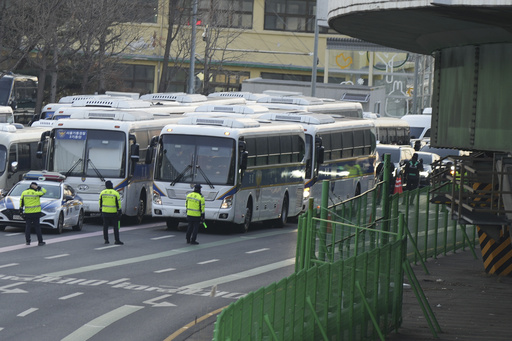SEOUL, South Korea — On Friday, investigators from South Korea’s anti-corruption agency attempted to detain Yoon Suk Yeol, the impeached President, but were met with resistance at his official residence. This resulted in a standoff lasting nearly six hours, highlighting the ongoing political crisis enveloping South Korea, during which two presidents have been impeached within a month.
The anti-corruption agency reported retreating after its agents faced significant obstacles from the presidential security service, which prevented them from entering the premises due to safety concerns. The agency expressed disappointment over Yoon’s noncompliance with legal protocols and indicated that detaining him would be almost impossible as long as he remained under the protection of the presidential security. They also expressed their intent to strongly urge acting leader, Deputy Prime Minister Choi Sang-mok, to instruct the security team to assist in executing the detainment order.
Outside the residence, a considerable number of Yoon’s supporters braved the cold weather, holding South Korean and American flags and chanting slogans in defense of the president. The National Police Agency announced plans to investigate the leadership of the presidential security service, suspecting them of obstructing official duties and scheduled them for questioning on the following day.
Yoon, previously a prosecutor, has so far resisted attempts by investigators to question him for weeks. His last public appearance was on December 12 when he made a televised address from the presidential office, vowing to confront efforts to remove him from power. Investigators are considering charges of rebellion against Yoon after he declared martial law on December 3, frustrated by opposition within the parliament that blocked his policies.
This declaration was quickly rescinded by parliament hours later, leading to Yoon’s impeachment on December 14 on charges of rebellion, prompting simultaneous investigations from both anti-corruption authorities and public prosecutors. A Seoul court issued warrants for Yoon’s detention and a search of his residence on Tuesday, but enforcement has proven complicated given his protection status.
Yoon’s legal team filed a challenge against the detention warrant, arguing that it could not be enforced as long as he is in his official quarters, referencing a law that safeguards sites tied to military secrets from search without consent. They also asserted that the joint investigation led by the Corruption Investigation Office for High-ranking Officials lacked jurisdiction over rebellion charges and noted that police assistance in the detainment could lead to their arrest by either the presidential security service or citizens.
If investigators succeed in detaining Yoon, they are likely to seek court approval for a formal arrest. Otherwise, he could be released after 48 hours. An anonymous official from the anti-corruption agency reported that their team managed to approach within 200 meters of Yoon’s residence but were blocked by a barricade of vehicles and security personnel. Although three prosecutors could approach the building, they were unable to confirm Yoon’s presence inside.
Legal experts point out that while the law mandates presidential protection, it does not give the security service the authority to obstruct court-ordered detentions. Given the serious nature of the allegations against Yoon, such actions could be viewed as obstructing official duties. Moreover, legal provisions requiring consent for searches at locations linked to military secrets may continue to hinder potential detainment efforts.
With the acting president Choi unlikely to facilitate such permissions, it complicates further actions by the anti-corruption agency. Park Chan-dae, the leader of the opposition Democratic Party, lamented the agency’s withdrawal and urged it to attempt detainment again. In contrast, Kwon Young-se, head of Yoon’s conservative People Power Party, condemned the agency’s actions as unfair, emphasizing no risks of Yoon fleeing or tampering with evidence.
While thousands of police maintained a perimeter around Yoon’s residence, there were no significant reports of violent confrontations. Notably, several high-ranking officials, including Yoon’s defense minister and police chief, have already been arrested due to their involvement in the martial law declaration.
Yoon’s presidential authority has been suspended since his impeachment on December 14, and his future now rests with the Constitutional Court, which is currently deliberating whether to uphold his impeachment or restore him to power. At least six out of nine justices must agree for his removal.
Additionally, recent developments implicated Prime Minister Han Duck-soo in the impeachment due to his hesitation in appointing new justices to the Constitutional Court amid rising pressure. In response, acting president Choi appointed two justices, which may affect the potential outcomes of Yoon’s impeachment proceedings.



